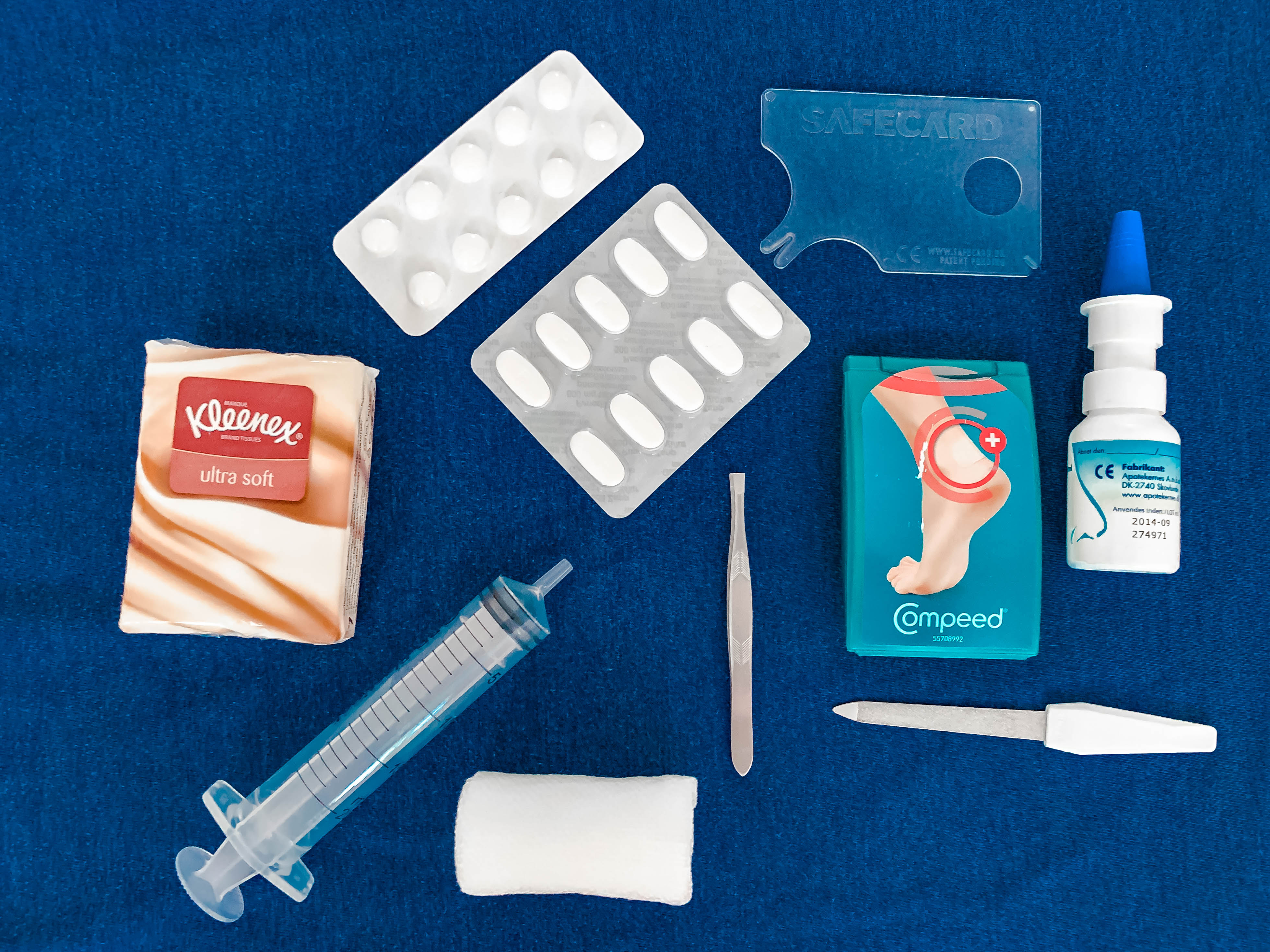Your travel vaccine checklist before travelling abroad

One of the top priorities on a pre-trip checklist is (or should be): travel vaccines. Which ones do you need for your upcoming trip?
In this post, we’ll take a look at what travel vaccinations are most crucial, what they prevent, and all the most vital travel shots information you need before you head out into the world.
This post contains referral links for products I love. Adventurous Miriam earns a small commission at no extra cost to you if you purchase through my links. I appreciate your support ♡ Learn more
Different types of travel vaccines
Routine vaccinations
You probably remember getting vaccinated when you where younger. And maybe you also get the annual flu shot? I do! By getting vaccinations against such diseases as measles, polio, and tuberculosis, you’re not only immunising yourself against these diseases but also ensuring that you don’t spread them.
Recommended vaccinations
Some diseases can still be found in almost every country in the world – the classic examples being hepatitis A, B, and C. So you need a travel vaccine that covers these common illnesses to keep safe wherever you go.
Required vaccinations
Some countries require proof of certain vaccinations before you can enter. This is primarily yellow fever vaccine and meningococcal (only in Saudi Arabia). So, always check with official health sources which travel vaccinations are required for safe travel wherever you’re going. Most countries that require yellow fever vaccine can be found in Africa and South America. But it’s always important to check the exact countries you’re planning to travel to first.

Where to get travel vaccines
I strongly recommend that you get travel vaccines in your home country where you’re insured and you know the procedures. It is possible to get vaccinated abroad, but if you plan to do that, at least bring your own syringes and needles! Also, there have been reports of counterfeit vaccines in the Philippines. I know you can save a few bucks by getting them abroad, but honestly it’s not worth risking your health.
Do this:
4 weeks before your trip, book an appointment at your general practitioner or travel health clinic to get your travel shots. If you’re not sure which ones you need, call ahead and ask. You can also find out here.
You can get vaccines here:
- Travel clinic (type in your own country to see available travel clinics)
- Health department (for Americans only)
- Yellow fever vaccination clinic (for Americans only)
How far ahead should you get the travel vaccines?
This can depend on the vaccine itself and is another thing you should check far ahead with. For example, for yellow fever you should get the yellow fever vaccine ten days before travelling. But for all forms of hepatitis you should get the vaccine two weeks ahead of your travel time. So, make sure to check what vaccines you need and when you need to get them, and do so at least a month before you travel.
How long does immunity from travel vaccines last
This also depends on the vaccine you’re getting. You’ll remember getting routine vaccinations as a child, like TB, which last for a lifetime. But that’s not always the case. The yellow fever vaccine, for example, should be topped up every ten years if you continue to travel to high-risk areas. And meningitis vaccines last roughly between three and five years so require more frequent booster shots.

Which vaccines do you need?
Below, I’ve specified the most common travel diseases you should be aware of. You should always check with your doctor or health clinic about the specific country/ies you’ll be visiting. There can be sudden outbreaks and you’ll want to be on top of that!
- Hepatitis A
- Hepatitis B
- Typhoid
- Meningococcal disease
- Yellow Fever
- Rabies
- Japanese Encephalitis
- Malaria
Hepatitis A
What is it: Hepatitis A is a liver disease that infects through contaminated water (the number one cause) or eating food prepared by someone with hep A. Infection can also be spread through sex and blood transfusions.
Symptoms include:
- Joint and muscle pain
- Exhaustion
- Fever
- Constipation or diarrhoea
- Loss of appetite
What’s the treatment? There is no cure for hep A, but treatment is easy and simple. Take painkillers, rest, eat small and light meals that won’t irritate your stomach.
How to avoid it: Get yourself travel immunisations two weeks before travelling, and make sure to eat at more trustworthy restaurants. Avoid drinking unclean water.
Risk areas: Although hep A can be found everywhere, it’s most notably found in South America, Southeast Asia, countries in sub-Saharan Africa, and Russia.
Hepatitis B
What is it: Like hep A, hepatitis B is a liver disease caused by close contact with an infected person. Exchange of bodily fluids is the most common cause, including sex, sharing needles, unclean tattoo parlours, and even sharing a toothbrush with an infected person.
Symptoms include:
- Stomach pains
- Jaundice
- Joint and muscle aches
- Diarrhoea
- Nausea
What’s the treatment? In the short-term (if you’re newly infected), you need medicines and rest to treat the symptoms. For long-term sufferers, there are specific medicines to alleviate the symptoms of hep B.
How to avoid it Avoid intimate contact in countries where hep B is common. This includes dubious tattoo and piercing parlours and unsafe sex. In short, be clean and sensible.
Risk areas: Hep B can be found in almost every country, but countries in South America and sub-Saharan Africa have far more sufferers and infected people with hep B than the rest of the world.
Typhoid
What is it: Typhoid is a potentially fatal bacterial infection that spreads through many of the body’s organs. It spreads through contaminated food or water and occasionally through direct contact with someone who is infected.
Symptoms include:
- A very high fever
- Muscle and joint pains
- A headache
- Constipation
- Coughing
What’s the treatment? Typhoid can be treated with a course of antibiotics.
How to avoid it: Getting a typhoid vaccine is your first step. Beyond the typhoid vaccine, also be sure to avoid any particularly dirty or unsanitary places in high typhoid risk locations.
Risk areas: The highest risk area is the Indian subcontinent, but you’ll also find typhoid in South America, Africa, and Southeast Asia.
Meningococcal disease
What is it: Meningococcal is an umbrella term for both meningitis and septicaemia. It’s a disease that leads to damage of the membrane that surrounds the brain. It spreads from close and prolonged contact with an infected person through coughing or kissing.
Symptoms include:
- Fever
- Cold hands and feet
- Vomiting
- Confusion
- Light sensitivity
- Seizures
What’s the treatment? Getting to the hospital is vital. Once there, you’ll be given antibiotics if it’s caused by bacteria rather than a virus. You’ll also be given fluids to keep hydration high, as well as steroid medication. Viral meningitis isn’t as serious as bacterial meningitis.
How to avoid it: Because there are many causes of meningitis, there are many vaccinations that can prevent it, including the MMR which many of us get as children. There is also the meningitis B vaccine and the 6-in-1 vaccine.
Risk areas: Sub-Saharan Africa.
Special requirement: As the only country, Saudi Arabia requires participants in the annual Hajj and Umrah pilgrimage show proof of meningococcal vaccination.
Yellow Fever
What is it: Yellow fever is a serious infection that’s spread by mosquitoes in hotter climates. Infection is almost always transmitted by mosquito bites, not between infected humans.
Symptoms include:
- Fever
- Headache
- Vomiting
- Back pain
- Light sensitivity
What’s the treatment? There is no cure, but your body can fight the infection if you help it along with painkillers, plenty of water, and rest.
How to avoid it: Get the yellow fever vaccine before you travel.
Risk areas: Hot climates like sub-Saharan Africa, South America and parts of the Caribbean.
Special requirement: Some countries require proof of yellow fever vaccination before you can enter IF you arrive from a high-yellow-fever-risk country in Africa or the Americas. For instance, if you’re going from the US to South Africa (where there’s no yellow fever), but have a layover in Ethiopia or Kenya (where there is yellow fever), you need proof of vaccination to enter South Africa. This is to prevent the decease from spreading. So, always check if you need the proof before heading out, and bring your vaccination card.
Rabies
What is it: Rabies is a serious and fatal but rare disease caused by a bite or a scratch from an infected animal. Mostly dogs, bats and monkeys.
Symptoms include:
- High fever
- Anxiety
- Headache
- Hallucinations
- Aggression
What’s the treatment? You can avoid the spread of infection by cleaning the wound thoroughly, disinfecting with iodine or alcohol, and immediately visiting a hospital or doctor.
How to avoid it There is a rabies vaccination which you can take before travelling to high-risk rabies areas.
Risk areas: Rabies is found all over the world, but mostly in central and southern Asia, South America and Africa.
Japanese Encephalitis
What is it: A viral brain infection caused by infection from a mosquito bite.
Symptoms include:
- High fever
- Seizures
- Loss of speech
- Tremors
- Paralysis
What’s the treatment? There is no cure, but the body can fight the infection if you get lots of rest, fluids, and painkillers.
How to avoid it: Get the vaccination before travelling abroad.
Risk areas: Ironically, not Japan anymore. Now, it’s mostly found in China and most of Southeast Asia.
Malaria
What is it: Malaria is a fatal disease that has killed half the people who have ever lived. Yeah, it’s a nasty one! It spreads through mosquito bites, and unfortunately, Malaria mosquitos bite 24/7 unlike most other mosquitos. On the bright side, the disease is fairly constricted to certain areas.
Symptoms include:
- High fever
- Vomiting and diarrhoea
- Hot flashes and shivers
- Muscle pains
What’s the treatment? Visit a doctor or hospital if you’re showing symptoms.
How to avoid it: Take antimalaria medication during your travels, and avoid mosquitos by using insect repellent and a mosquito net.
Risk areas: Much of Africa, Central and South America, and Southeast Asia.
Things to consider
Wherever you visit, it’s important to check exactly what travel injections are recommended by doctors and government health officials. When deciding which travel injections you need and when you need it, there are a few things to consider. Let’s take a look at what those are:
Where you will be traveling (urban or rural areas) – Will you be visiting developing countries and rural areas? That may bring you into contact with more diseases, which means you might need more vaccines before you visit.
How long you will visit – If you’re visiting for a short period, you’re at a lower risk of disease and infection, but longer trips will raise your chances of illness and the need for holiday vaccinations.
What season you will visit – If you’re visiting in the summer, diseases like malaria are at their most frequent and dangerous. In colder seasons, the danger is far lower.
Lodging conditions – If you’re camping in the open air, you’re at a higher risk from mosquito bites and other animal invaders, as well as contact with unclean food and water. So, consider how clean and closed-off your accommodation is.
Mode of travel – If you’re travelling in the open air on bikes and tuk-tuks you’re also at further risk of infection, as opposed to trains and planes which are often more sanitised.
Food – Think about where you’re eating and what you’re eating. Street food, while delicious, can be unclean or undercooked in certain countries. While high-end restaurants will have higher quality foods on offer.
Planned activities – If your activities involve wilderness adventures, safaris, and hikes, then you’ll need to take precautions when it comes to bringing mosquito repellent, medicines, and first aid.
How to prevent holiday sickness
Here are a few precautions to take when you’re out travelling in areas with higher risks of certain tropical diseases. Follow these tips to keep yourself safe and healthy!
- Drink bottled water – Do not rely on open water sources or tap water in most countries. Buy bottled water to avoid any danger of waterborne diseases.
- Wash your hands – Keep your hands clean regularly with soap.
- Bring a medical kit – Always have medicine, wound-cleaning things like alcohol or iodine, and bandages with you in case of an emergency.
- Be aware of food hygiene – Think about what you’re eating and drinking, and where you’re getting it from, Only buy and eat foods that you’re sure are cooked cleanly and properly.
- Use mosquito and bug repellent – It’s worth spending a little extra on the really good stuff here. Especially when it comes to malaria and dengue fever! Get the best bug repellent on the market, and spray like your life depends on it!
Read next: How to prevent holiday sickness
Don’t forget travel insurance
Having travel insurance means always being able to visit any doctor or hospital and be treated without issue. You don’t ever want to be in a position where you need medical help but aren’t insured. I use World Nomads Travel Insurance wherever I go.
What to pack in your medical kit:
I carry all these essentials in my medical kit. It might seem like a lot, but it doesn’t take up much room (and I prefer to be prepared):
- Antibiotics (if travelling off the beaten track)
- Antidiarrhoeal drugs (e.g. loperamide or imodium)
- Antihistamines (for hay fever and allergic reactions – I got a sudden allergic reaction in Armenia and I had no known allergies. You just never know when it hits)
- Antimalaria pills (if you’ll be in malarial areas)
- Diamox (if you’re travelling in high altitude like Tibet, Bolivia or Peru)
- Bandages and gauze
- DEET-containing insect repellent
- Paracetamol or aspirin
- Scissors and tweezers
- A tick card (to prevent Lyme disease – we never leave home without it)
- Sterile needles and syringes (if travelling to remote areas)
- Thermometer
- Sunscreen (reef-safe)

More safety posts you might like
- 10 common travel scams and how to avoid them
- Bali scams – and how to avoid them
- 27 essential travel safety tips everyone should know
- 20 solo female travel safety tips
- Do I really need travel insurance
- 8 common taxi scams (and how to avoid them)
- Travel Insurance (Review) – Do I REALLY Need It?
- 10 easy ways to treat Altitude Sickness (AMS)







Thanks for informing me that it’s highly recommended to get immunization or vaccinations before traveling abroad. My girlfriend and I are planning to spend a one-month vacation in the Caribbean, so we should probably be vaccinated against yellow fever before our flight next month. I’ll follow your suggestion and check if the places we’re traveling to need a yellow fever vaccination proof so we can bring our vaccination card along with our trip. Thanks for this!
I’m glad you found it helpful, Levi. And once you got the yellow fever shot, it gives you lifelong protection.